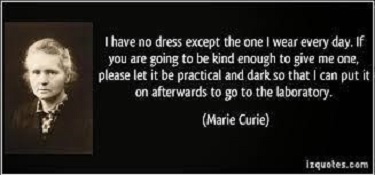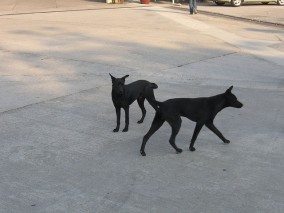 Do you notice what other people wear? Do you ever feel self-conscious about your own clothes? Although we may dismiss clothing as surface-level compared to the body and personality, clothes are central to ways our bodies are experienced, presented, and understood within culture. Clothes mediate between the naked body and the social world, the self and society. Every day, we experience the bodies of others—and conceive of our own—through the medium of dress.1
Do you notice what other people wear? Do you ever feel self-conscious about your own clothes? Although we may dismiss clothing as surface-level compared to the body and personality, clothes are central to ways our bodies are experienced, presented, and understood within culture. Clothes mediate between the naked body and the social world, the self and society. Every day, we experience the bodies of others—and conceive of our own—through the medium of dress.1
We wear clothes not only as protection from the elements of nature, but also as a way to express our individuality or to shield ourselves from other people’s opinions. This column will offer exercises for how to use clothing to inform your writing.
Poet, Pablo Neruda writes with devotion about his clothes and his relationship with them in his poem, Ode to Clothes.
Every morning you wait,
clothes, over a chair,
to fill yourself with
my vanity, my love,
my hope, my body.
Barely
risen from sleep,
I relinquish the water,
enter your sleeves,
my legs look for
the hollows of your legs,
and so embraced
by your indefatigable faithfulness
I rise, to tread the grass,
enter poetry,
consider through the windows,
the things,
the men, the women,
the deeds and the fights
go on forming me,
go on making me face things
working my hands,
opening my eyes,
using my mouth,
and so,
clothes,
I too go forming you,
extending your elbows,
snapping your threads,
and so your life expands
in the image of my life.
In the wind
you billow and snap
as if you were my soul,
at bad times
you cling
to my bones,
vacant, for the night,
darkness, sleep
populate with their phantoms
your wings and mine.
I wonder
if one day
a bullet
from the enemy
will leave you stained with my blood
and then
you will die with me
or one day
not quite
so dramatic
but simple,
you will fall ill,
clothes,
with me,
grow old
with me, with my body
and joined
we will enter
the earth.
Because of this
each day
I greet you with reverence and then
you embrace me and I forget you,
because we are one
and we will go on
facing the wind, in the night,
the streets or the fight,
a single body,
one day, one day, some day, still.2
The personification of clothes in this poem brings to life items—seemingly simple things–that we often take for granted or consider utilitarian. Through the poetic eye, Neruda sees clothing as a loyal friend. While he puts on his clothes in the morning, he notices how his clothes take on the mold and contour of his body. Neruda writes of admirable qualities, shared experiences, and reverent regard for his clothes.
Jac Jemc wrote about the character, “my wife” in her novel My Only Wife. Notice what is observed and the deeper implications of acceptance in what you wear.3
“She wore trousers, never wore skirts. Her clothing complemented her, it seemed integral to her personality. She filled her clothes the way one fills one’s skin: exactly. It was as difficult to imagine her without skin as it was to imagine her undressed…There was a theatricality to her way of dressing that made heads turn…These pants my wife wore had very wide legs. She liked to wear many layers to bulk up her frame. She liked structure in her clothing…She liked angles and excess fabric in unexpected places. She liked frayed edges and thinned spots…My wife could have a sense of humor, too. She would pull on opera-length satin gloves, a tiara, pearls, sunglasses, all very Breakfast at Tiffany’s, but combined with her wide-legged pants and her gamut of worn-thin tee shirts, she was often eyed as being a bit off. I adored her oddities. My wife was magnificent and content in her whimsy.”
What is your relationship with your clothes? What does the world observe in what you wear? What are the deeper implications for acceptance?
Describe your favorite outfit. How does it make you feel to wear it? Describe an item in your closet that you never wear. Why not? How does it make you feel to wear it? Write about a time you dressed in clothes that made you feel striking despite graceful form or clumsy movements.
Our clothing carries histories, memories, and meaning, and can serve as a jumping-off point for a piece of writing. Write an ode to your belt, a pair of shoes, or a favorite piece of clothing.
Both clothing and writing are external to us and yet deeply connected to us. How do you describe your style? How do you describe your personality? What style of clothing compliments you — expresses your personality? How do your clothes tell the world a bit of your story? How does your writing say something about how you dress? Do you consider what you wear analogous to your writing style? What details will your reader’s pick up on?
Look back on your experience with clothing during your youth. How did you prefer to dress as a kid? Write about a time you had no choice in what you wore. What did it feel like to be forced to dress differently from what felt good and right to you?
Write about what your clothes reveal or conceal physically, emotionally.

Both writing and clothing can be textured and colorful. Describe your writing texture. Compare it to your favorite article of clothing for the textual/textural similarities. Write about your tendency to adorn your words, over accessorize with ancillary words, use sensory imagery? What have you written lately that is woven in rich texture?
We layer and deepen our stories using vivid language, strong emotion, dynamic characters, and plot lines that build one conflict or point on another. Texture is meant to be felt and building texture into a story can help create unique characters that have dimension.
What words that describe fabric correspond to your writing style? Are your words silky, woolly or more like burlap or corduroy?
Think about your raw material. Are your handcrafted words tailored to best suit your style? Is your style eloquent, dark, economical, formal, clean, business-like, crisp, flowery, balanced, comfortable? Or is the body of your work clothed in chaos? Cloaked to conceal your essence, your voice? What would your innermost garments tell the reader about you?
Wearing a different type of clothing can oftentimes be a nice break in our established habits. The same is true for writing. Think about your clothing and writing. How does your body look in differently shaped clothes? Have you ever crossed genres? Been keen on experimenting? Wore/wrote something unfamiliar? Have resisted ‘genre’ in clothing or writing in an effort to be innovative? Describe a time you communicated resistance, a new interpretation or redefinition. What topics have you most explored, inhabited in your writing? Describe your best-layered body of work.
What are you holding onto in excess words? Are you slowly wiping away traces of the past? Are answers hidden in the seams? What holds your writing together?
The person we believe ourselves to be will always act in a manner consistent with our self-image.
–Brian Tracy
Dress yourself in the expectation of new possibilities.
- Twigg, J. (2007). “Clothing, age and the body: A critical review.” Ageing & Society, Cambridge University Press. 27: 285-305.
- After the poem Neruda, P. (n.d.). “Ode to Clothes.” Retrieved from http://www.poemhunter.com/poem/ode-to-clothes-2/comments.asp
- After the mention of the novel Jemc, Jac. (2012). My Only Wife. Chapter three. Dzanc Books. pp. 7-9.
Debbie spent 30 years as a registered nurse. She became a certified applied poetry facilitator and journal-writing instructor in 2007. She is currently a student in the Johns Hopkins Science-Medical Writing program. Her publications have appeared in Journal of Poetry Therapy, Studies in Writing: Research on Writing Approaches in Mental Health, Women on Poetry: Tips on Writing, Teaching and Publishing by Successful Women, Statement CLAS Journal, The Journal of the Colorado Language Arts Society, and Red Earth Review.



 Weeks after my girlfriend ended our relationship of seven years, I moved from the island side to a quieter, greener part of Hong Kong, hemmed by country parks, opposite a reservoir. She ended up moving to a nearby block on the same street. Together we had accumulated three stray dogs and three stray cats, and they were still a family even if we were not. We swapped spare keys and agreed to a time-share arrangement for our pets. I couldn’t imagine a scenario in which I took three and she took three. Losing her had been enough.
Weeks after my girlfriend ended our relationship of seven years, I moved from the island side to a quieter, greener part of Hong Kong, hemmed by country parks, opposite a reservoir. She ended up moving to a nearby block on the same street. Together we had accumulated three stray dogs and three stray cats, and they were still a family even if we were not. We swapped spare keys and agreed to a time-share arrangement for our pets. I couldn’t imagine a scenario in which I took three and she took three. Losing her had been enough.
 Some years ago now, my daughter found a possum skull partly buried in the woods behind our house. She was sixteen. She dislodged the skull from the earth with her fingers, washed it with a hose, then left it on a retaining wall by the back driveway. I could see the skull from my office window while I was working at my desk, could see it when I was mowing the grass, waiting there without comment or judgment. The skull remained on the property for several days before, mysteriously — perhaps a neighborhood dog wandered by — it was gone forever from our lives.
Some years ago now, my daughter found a possum skull partly buried in the woods behind our house. She was sixteen. She dislodged the skull from the earth with her fingers, washed it with a hose, then left it on a retaining wall by the back driveway. I could see the skull from my office window while I was working at my desk, could see it when I was mowing the grass, waiting there without comment or judgment. The skull remained on the property for several days before, mysteriously — perhaps a neighborhood dog wandered by — it was gone forever from our lives.